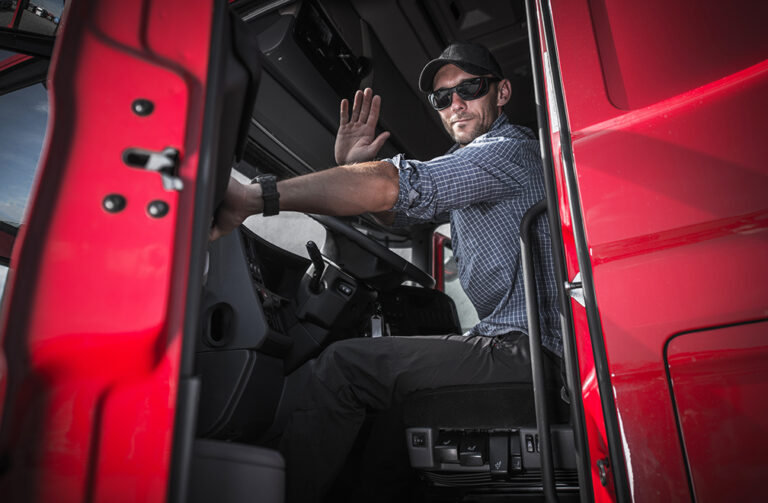Most drivers learn quickly that all driving jobs aren’t the same. It seems there’s always a better job waiting — one with more pay or better home time, newer trucks or more driver-friendly freight, routes that go through sunny southern states and never to the big city, and so on.
Whether you’re applying for your very first driving job or you’re an old hand in the industry, understanding how the hiring process works and preparing yourself is a good way to help ensure you get the job you want.
The trucking industry is unique in that the job “interview” is seldom a single face-to-face meeting with a prospective employer. Instead, the first interview often happens by phone and involves a recruiter. After background checks are completed — and assuming that both you and the carrier are interested — you’ll be invited to orientation.
While it’s easy to think that this invitation means you’re hired, many drivers don’t realize that orientation is, in many ways, a continuation of the job interview. You’re learning more about the carrier and what you can expect when you get to work. At the same time, the carrier is gathering more information about you, often including testing to evaluate your skills, knowledge and even your attitude. If either you or the carrier determines the job isn’t a match, the process can be stopped before you’re out on the road in a truck.
Preparation is the key to every stage of the interview.
Carriers are required by regulations to gather specific information from you and to check your background. For example, it might seem simple, but it’s amazing how many drivers show up to orientation without their CDL and Social Security card. The employer is required to fill out a form I-9, a document they sign signifying that they have verified your identity and that you are legally authorized to work in the U.S. Your CDL and Social Security card provide the needed proof. Other documents, such as a passport, may be accepted — but you don’t want to be scrambling to find documents while you’re in orientation.
Other information the carrier must have a record of is a list of all of your employers for the past five years, and all DOT-regulated employers for the past 10 years. Failing to disclose a particular employer can make it seem as if you are hiding something.
Keep a list of former employers, including the dates you worked there and the reason you left, and include contact information. This is especially important if you’ve worked for smaller carriers, such as farm operations; it’s often difficult to contact someone who has access to employment records. Update this list each time you change employers.
Here’s a bit of advice about your reason for leaving employment: Prospective employers look for patterns in your employment history. If you left your last job because you needed more pay, that’s fine. If you left your last six jobs, all for more pay, and you only stayed a few months at each job, it’s easy for a recruiter to predict you’ll leave your new job as well.
Resist the urge to disparage a previous employer. Anyone can have a bad experience, but if your application is filled with negatives about the carriers you previously worked for, recruiters may quickly decide that the problem could be YOU, not the employers.
If you did have a bad experience, you need to be able to rationally explain what happened. Leave emotion out of the conversation. State the facts as best you know them. Everyone makes mistakes, and everyone sometimes has to work with difficult people. If you calmly explain what happened, what you did to try to fix the problem and what you learned from the experience, you may help the recruiter to be empathetic about what happened.
Also, make sure your employment record matches your statements. Your prior employer will provide their version of why you left, including whether you resigned or were fired. They may also report accidents, incidents and other information, including whether you quit while under dispatch or abandoned your truck. Motor Vehicle Reports (MVRs) and your Pre-Employment Screening Program (PSP) report may also show accidents or citations. All of these are available to you before you even apply for a new job. A quick way to make a recruiter suspect your side of the story is if it differs from the evidence in the records.
Remember that an interview should involve a two-way sharing of information. It helps to make a list of what you expect from your new employer. Start with what’s most important to you. It’s better to discuss those things with a recruiter prior to orientation, but you should never get in a truck and go to work without having your questions answered.
One thing that’s often misunderstood is the rate of pay. Recruiting advertisements often tout a best-case scenario but may not include pay for empty miles or pay rates that change due to trip length or region. Make sure you understand accessorial pay like detention, layover and breakdown.
When you’ll be paid is often as important as the amount. How long does the carrier hold back? What are paperwork requirements? What if you need an advance?
That shiny new truck in the photo may not be like the one you are assigned. You may be required to run the Northeast or to colder parts of the country in winter. You may be required to load or unload trailers, or to assist in the process.
Home time is an issue that too often isn’t clarified. What does “home every weekend” mean? Will you get home on Friday and leave on Monday? Or will you get home long enough for a 34-hour restart at some (not guaranteed) point during the weekend?
If it’s important to you, ask. Remember that the folks at home will have questions, too. It’s a good idea to find out what’s important to a spouse or loved one so you can provide answers.
The old adage, “you never get a second chance to make a first impression” holds true. Start your job off right by cruising through the interview process.
Cliff Abbott is an experienced commercial vehicle driver and owner-operator who still holds a CDL in his home state of Alabama. In nearly 40 years in trucking, he’s been an instructor and trainer and has managed safety and recruiting operations for several carriers. Having never lost his love of the road, Cliff has written a book and hundreds of songs and has been writing for The Trucker for more than a decade.











